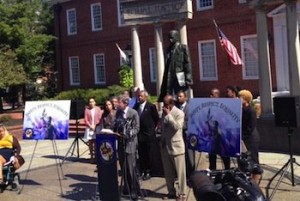
by William J. Ford
Special to the NNPA from The Washington Informer
Vanessa Fleeton recalled when a Black police officer became rude to her a few years ago while she parked near an illegal area in Bowie, Maryland.
After the officer gave her a verbal warning and left the scene, Fleeton immediately called the police department to make a complaint about the officer’s behavior.
“I know I was parking in the wrong spot, but you don’t have to treat me like a criminal. We all have bad days but his behavior was uncalled for,” said Fleeton, a Lanham, Maryland resident. “Anytime you get stopped, [policemen] have the power over you. Racial profiling should be against the law everywhere.”
Stories like Fleeton’s of negative interactions with police officers may have served as an impetus in Maryland Attorney General Brian E. Frosh’s decision to issue new guidelines for law enforcement agencies. The guidelines will end the pursuit of alleged suspects based on characteristics that include ethnicity and sexual orientation.
Frosh announced these rules during a news conference Aug. 25 in Annapolis that made Maryland the first state in the nation to follow the new rules first presented in December by former Attorney General Eric Holder.
Profiling stems from an illegal practice when officers target alleged suspects for a crime based on individual characteristics such as race, gender, disability and religion. Although Maryland law enforcement agencies have laws against racial profiling, a nine-page memorandum looks to enhance the state’s current policies.
The new guidelines are outlined in two categories.
Officers aren’t allowed to judge personal characteristics such as religion and race “when conducting routine police work.” For example, officers aren’t allowed to investigate people with limited English proficiency to determine whether they are illegal immigrants. The second part explains that “investigations of specific crimes or criminal schemes, law enforcement may take those factors into account if they have credible evidence that those characteristics are directly relevant to the investigation.”
These regulations come amid national outcry about the treatment of Blacks either killed by police officers or those who later in their custody, including Michael Brown, 18, in Ferguson, Missouri; Tamir Rice, 12, in Cleveland; and Sandra Bland, 28, in Waller County, Texas.
Prince George’s County State’s Attorney Angela Alsobrooks said she encountered a police officer’s rude behavior as a 14-year-old student after a high school dance at the now-defunct La Reine High School in Suitland.
Alsobrooks said Prince George’s County police officers have a good rapport with the community. She noted that the new state racial profiling guidelines are already implemented into the county’s police procedures and regulations.
“Prince George’s is on the cutting edge in so many of these reforms,” said Alsobrooks, 44, who attended the news conference in Annapolis last week. “We want the community to know that we are doing everything we can to make sure this doesn’t happen to anyone. We have come a long way, but we still have some work to do.”
Alsobrooks said the county’s Human Relations Commission received only one formal complaint of racial profiling this year.




